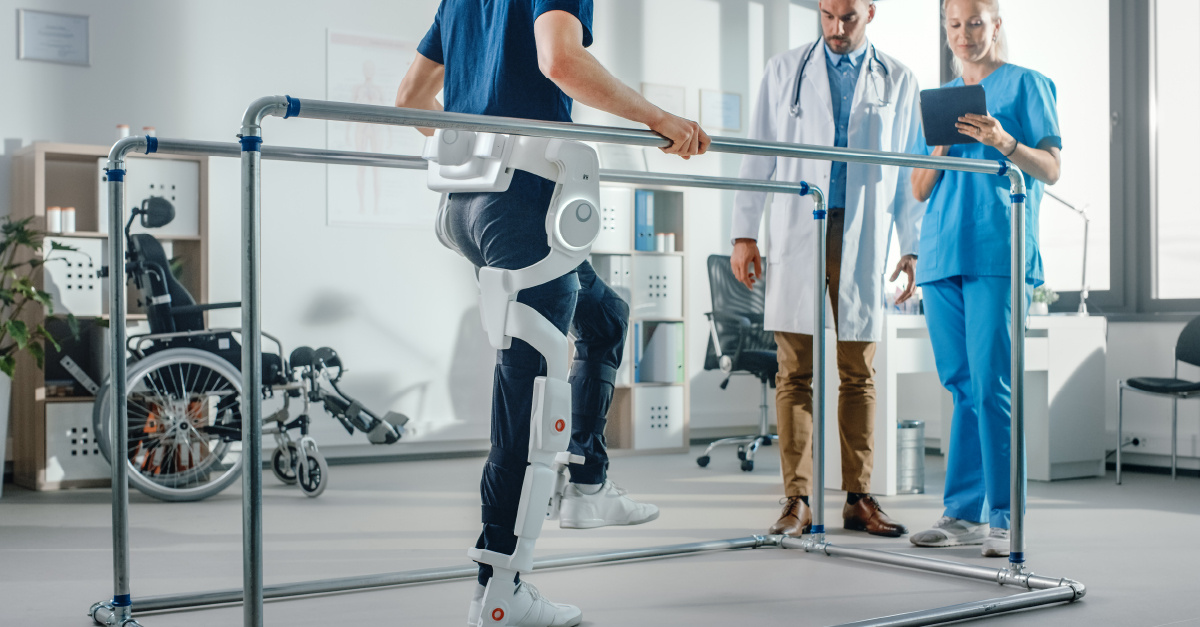The transformative power of artificial intelligence (AI) is set to touch nearly every aspect of life sciences. Its potential is so great that forecasts suggest generative AI could create $60-110 billion economic value a year for pharmaceutical and medical product companies.
Much of this value will come from using AI to optimise processes and increase efficiency, while this evolving technology also unlocks new opportunities for medical device development and manufacturing.
Let’s explore how medtech companies can leverage AI to boost revenue and increase functionality – while remaining compliant with necessary regulations.
-
Accelerating time to
market in medtech
Building technology for the healthcare industry can be an arduous process filled with lengthy workflows, whether developing digital solutions or software. Delays can occur at any step – research, operations, code development and more.
According to the World Health Organisation, the average medical device takes between three and seven years to come to market, a key concern for business leaders and health professionals.
However, generative AI – which leverages existing data to produce new outcomes – offers a route to acceleration of several stages, including:
- Design development
Considering complex datasets containing parameters, constraints and variables, generative AI can quickly produce designs that align with regulatory standards. Developers can provide feedback using their own expertise, user knowledge and use case experience, which the AI can then quickly apply through various iterations until a final design is agreed.
- Testing and simulation
Once designed, advanced generative models can support testing and simulation. Paired with digital twin technologies, manufacturers can predict how such devices perform in different locations, such as hospitals or care facilities.
- Compliance
Compliance is crucial in a highly regulated market. Generative AI can help with manual tasks, such as creating documentation needed for submission. With the correct application, hundreds of hours could be saved by streamlining the creation of accurate technical and promotional documents.
However, with a data-first approach, medtech companies can now leverage more advanced solutions such as agentic AI – despite high regulatory obligations. Our first-of-its-kind accelerator uses multi-agent autonomous teams to speed up complex workflows and tasks.
With data at its core, every step taken by the AI agents is logged for transparency and governance. This approach allows the medtech industry to leverage AI beyond automation to completing challenging tasks while remaining compliant at all times.
-
Boosting device functionality with AI
We are already seeing the introduction of generative AI and other forms of this technology in wearables, medical devices and aids.
- AI-powered wearables and wellness platforms
We’re working with customers to develop ways to incorporate this technology into mobile and camera-equipped devices to quantify and measure vital signs. Effective implementation of AI can power personalised, dynamic health insights by utilising data from wearables and smartphone apps.
- Tailored treatment and medical aids
This personalisation can be taken a step further, using generative AI to analyse patient data and provide recommendations for tailored treatment plans, customised prosthetics and orthotics and other bespoke medical aids.
- Increased device accuracy
Medical devices designed for healthcare settings or research facilities often rely on more advanced technology, such as signal detection and processing. AI can boost the functionality of these devices by removing image noise, resulting in more reliable device performance. ZEISS Microscopy, for example, has developed solutions to empower researchers with AI-enabled tools to improve their workflows.
-
Enhancing data collection and management
The world of health and life sciences relies on accurate, comprehensive data to provide diagnoses, drug development and treatment efficacy. However, managing and utilising such large datasets brings significant challenges.
Generative AI thrives on data. By using it to automate manual processes, experts are freed up for higher value creation and can focus on less mundane tasks.
- Automated data collection
In developing devices and software for the industry, large datasets must be recorded to monitor efficacy, reliability and test outcomes. Generative AI can automate data collection and organisation – categorising, mapping and identifying data needed for different stages of the development process.
- Data-driven decision making
While decisions on device production, design and deployment will always remain with the experts involved, these decisions should be driven by accurate and comprehensive data analysis – especially in a field as sensitive as healthcare.
Generative AI has the potential to accelerate the process, increase accuracy and reveal hidden insights in data analytics that may previously have gone unnoticed. In turn, these insights can empower medtech companies to create more effective and higher quality healthcare solutions.
The future of medtech
It’s difficult to imagine just how far-reaching the impact of AI will be on medical devices and associated software. However, we’re confident that this technology will transform the industry – and it’s only just beginning.
With the introduction of agentic AI, leveraging the power of data and multi-agent autonomous teams to accelerate complex workflows, the time to market for medical device enhancements will likely shrink dramatically, while functionality prepares to soar.
To harness the potential of this technology, begin by downloading our whitepaper: Unlocking the Potential of Generative AI in Healthcare and Life Sciences.
